I’ve started a new venture, guided walks around the buildings of architect Watson Fothergill in Nottingham. I’ve conducted two walks so far, and I am planning more events soon. At the moment the details are over on WatsonFothergillWalk.com
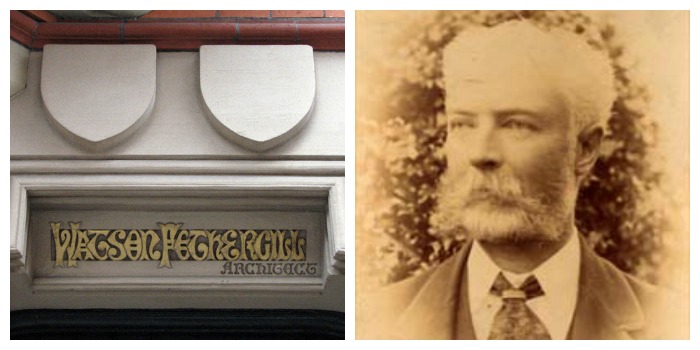
Writer, Researcher, Tour Guide
I’ve started a new venture, guided walks around the buildings of architect Watson Fothergill in Nottingham. I’ve conducted two walks so far, and I am planning more events soon. At the moment the details are over on WatsonFothergillWalk.com

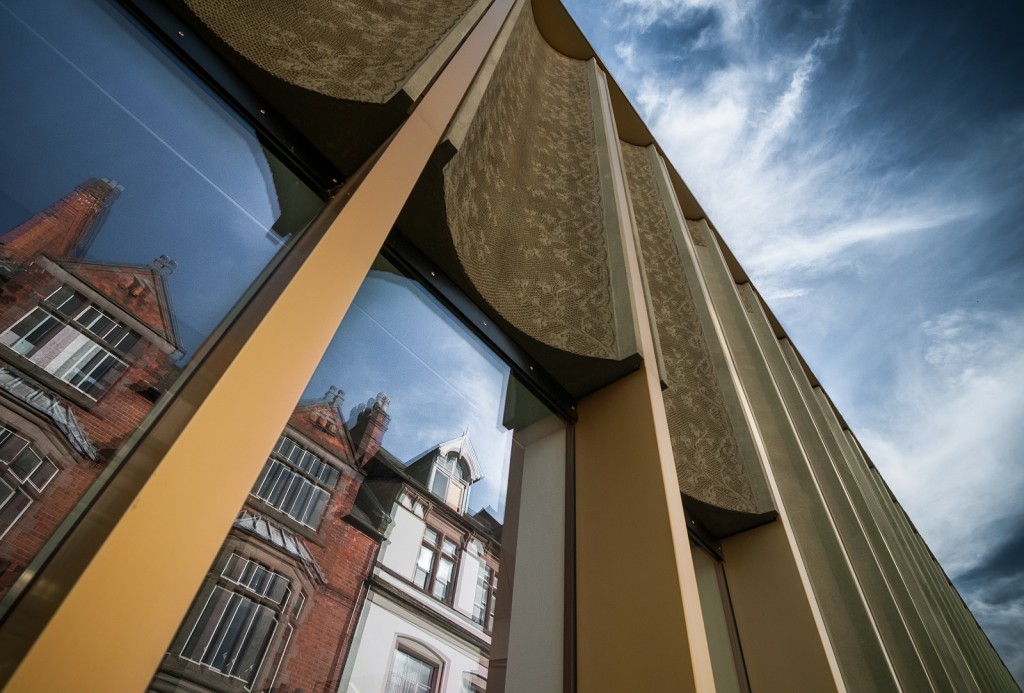
These days Nottingham has thriving art and music scenes, independent shops, decent coffee and even the first independent UK book shop to be opened this century, Five Leaves Books.
Working in association with Walking Heads, my colleagues based in Glasgow, we realised that these two great post-industrial cities have much in common as they re-invent themselves for the challenges of the 21st century.
The tour looks at the history of the area of Nottingham now designated as The Creative Quarter and meets some of the people who work in the varied creative industries in the area.

The tour takes in The Lace Market, Hockley and Sneinton Market including New College Nottingham, where students of art and design learn their trade, and established independent craft practitioner Debbie Bryan who takes inspiration from the Nottingham’s lace heritage. There is art from leading gallery Nottingham Contemporary and curator Jennie Syson; Find hidden gems in unexpected places, like a Morris & Co window in the largest pub in town. Dig down to the caves and secret passageways of The Galleries of Justice, one of Nottingham’s top tourist attractions and discover some remarkable stories from the history of St Mary’s, Nottingham’s oldest and largest church and find out how it is used as a creative venue today; Learn about local cultural magazine Left Lion, who bring Nottingham musicians, actors and writers into the limelight. Explore the regenerated Sneinton Market and the thriving gallery scene around St Ann’s and Sneinton.

Celebrate 25 years of Nottingham media and cinema, at Broadway and find out about the “playable building” that is home to the National Videogames Arcade. Finally step through the gate of the transformed Cobden Chambers to find independent businesses getting established with the help of Creative Quarter, not to mention tales from Dawn of The Unread, where Nottingham’s literary past is woven with the many layered history of the textile and lace industries which built the grand architecture of The Lace Market…
The tour is narrated by Nottinghamshire-born Dorothy Atkinson, who you may know from her work in films made by Mike Leigh… we recorded at JT Soar, a nearby studio & music venue which used to be a Fruit and Veg warehouse.
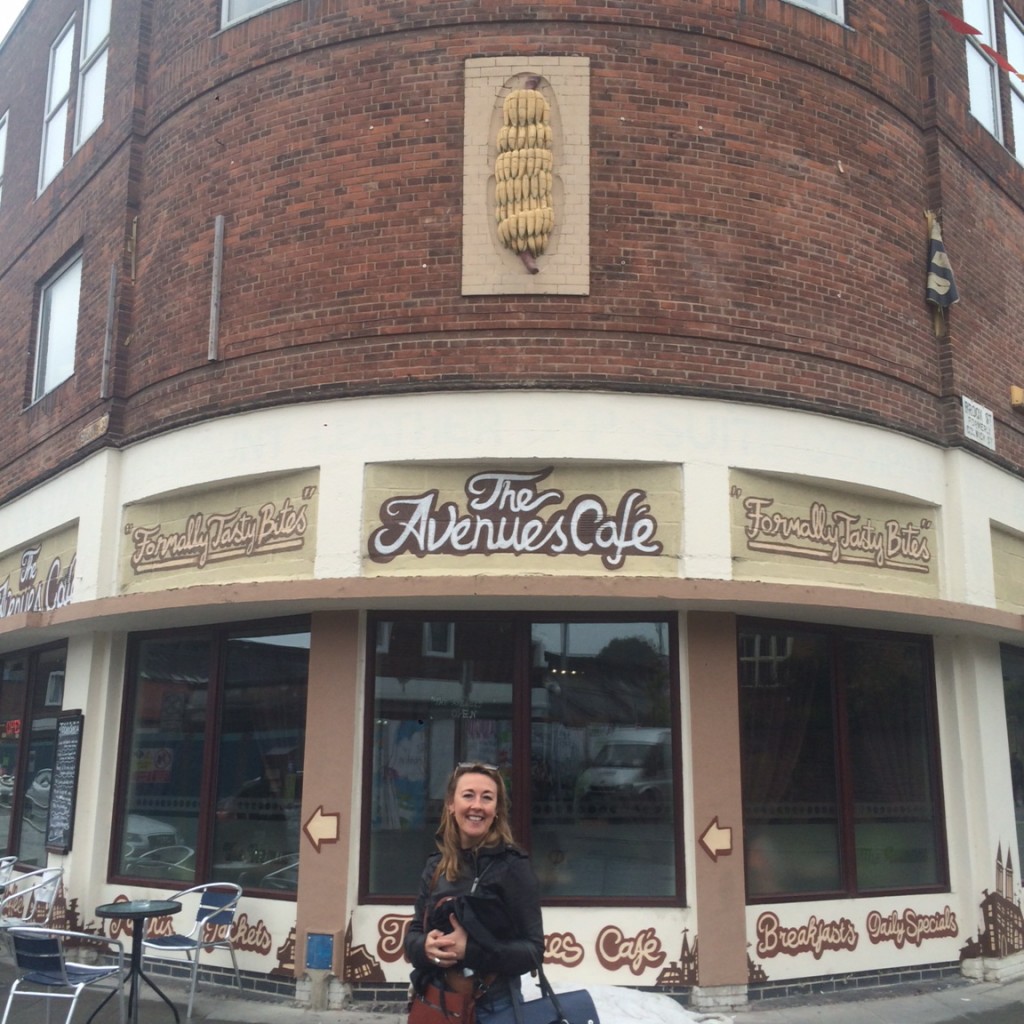
The tour features archive photos from Picture The Past, who have kindly let me use images as a pilot scheme.

The tour is available to download free on Guidigo (which is also free) on iPhones, iPads and Android devices.
I took a notion to go to Manchester and see the Cornelia Parker exhibition at the newly re-opened Whitworth Art Gallery before it closes on May 31. While I was in the city I braved the rain and hail to walk a couple of routes of the Manchester Walking Tours app.
I started with the Architecture Highlights tour – having downloaded the app at home, it was a case of zipping up my waterproof over my headphones, burying my phone in my pocket and heading out into the streets to discover and rediscover some of the key buildings of the city. The tour is trigged by GPS and takes account of your position, as you hit each location, the relevant information plays.

Along the way I learned about buildings including the Portico Library, The Midland Hotel, The Free Trade Hall and the Beetham Tower.
After an hour of rain dodging I found a shop/ cafe on the edge of the Northern Quarter called Oklahoma, it appealed to my love of all things colourful and kitsch. If I had a shop, this is probably what it would look like!
Later I picked up the route of the Cultural Tour, which at 150 minute was considerably longer that the first one. Narrated by 6 Music DJ Mary Ann Hobbs, it takes in a wide variety of locations and was compiled by local tour guides. I explored the Northern Quarter and then found that the route crossed over with the Architecture tour. Having the GPS tracking you for over an hour absolutely kills an iPhone battery, and as I needed my phone for meeting friends later and I wanted to get to the Whitworth in time to see some art, I hopped on bus down Oxford Road. As the GPS locates you and triggers the tour when you reach each point of interest, I was able to miss out a section and pick up the trail further along. This method takes a little getting used to, and is frustrating if you need your phone for anything else during your day out, but once I got used to moving about to find the exact spot that set off the commentary, the system worked. I need a pedometer-powered battery charger…
The Whitworth Gallery has reopened after an extensive refurbishment, and it is quietly impressive. The majority of the open plan space was taken up by a solo show by Cornelia Parker, the show included one of my favourite pieces, the exploded shed – Cold Dark Matter: An Exploded View (1991).

After an impromptu night out with Manchester friends, I crashed on a sofa and returned the following day to pick up the section of the Cultural Tour that I missed. The Cultural Tour added a little more to the story of the Bridgewater Hall, where I found the intriguing “Talking Statue” of Halle Orchestra conductor John Barbirolli voiced by Timothy West. Apparently there are more of these statues around, it’s a really good idea well carried out and I’d like to find the rest of them.
I carried on following the tour route to see the site of the original Hacienda club, the newly opened Home arts centre and then stumbled upon the headquarters of the International Anthony Burgess Foundation. I don’t know much about Burgess beyond ‘A Clockwork Orange’, but this little place is home to a library, archive and a cafe- bookshop providing a little haven from the bustle of Oxford Road. I’ll definitely have to go back to Manchester for more exploring.

Yesterday I ventured to the other side of Trent Bridge for a talk at West Bridgford library. The topic was local architect Watson Fothergill, whose characteristic Victorian Gothic buildings can be found around Nottingham. I am particularly interested in his office building (pictured above), which can be found in Hockley on George Street. I’m hoping to include it as a stop on a tour of the area that I’m slowly working on. Fothergill was born very near where I went to school, so I was intrigued to find out more.
The talk was given by Darren Turner, himself an architect, who has taken on the task of cataloging Fothergill’s buildings. He’s even published a book, filled with sketches and as much detail as any local researcher could wish for, about the buildings that are still standing and those that have over the years been demolished.

Fothergill Watson was born in 1841 in Mansfield. His work dates from 1863 to around 1912 and in that time he mainly worked in and around Nottingham. In 1892 he switched his name around by deed poll, in order to carry on his mother’s family name (although it was to no avail as his own children didn’t produce any decedents of their own.) It seems he received a large inheritance from his father in law, one of the founding partners in Mansfield Brewery, and being comfortably off never saw the need to venture much beyond the county boundaries. Fothergill was well connected locally with a half-brother on the Mansfield Improvements Commission and the influential Brunts’ Charity, which lead to several building projects.
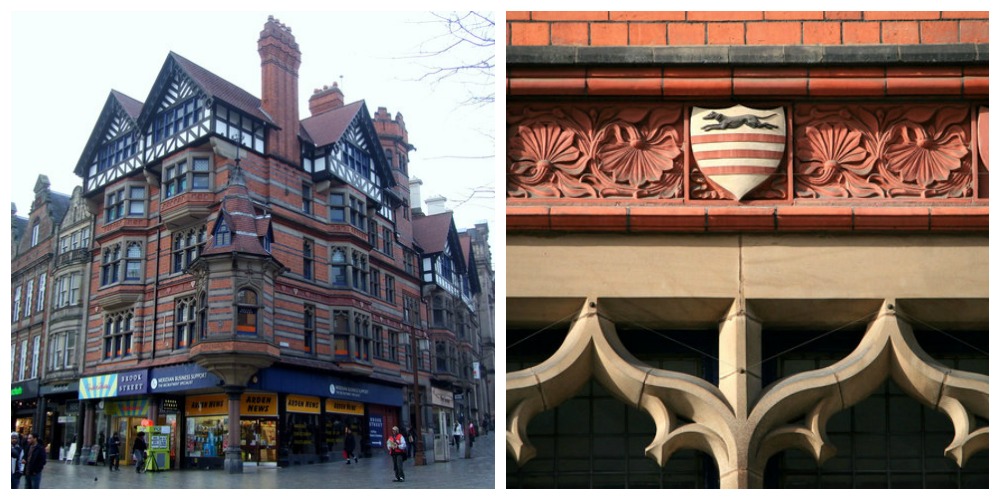
Several of Fothergill’s buildings in Nottingham have a distinctive look. Made of red brick with a striped pattern of blue, they also often have turrets, timber eaves and stone carvings. Anyone who has visited the centre of Nottingham is likely to have seen his Queens Chambers on the corner of Long Row and Queen Street, or the Nottingham and Notts Bank building on Thurland Street. You might also have passed the former Daily Express Offices on Parliament Street.
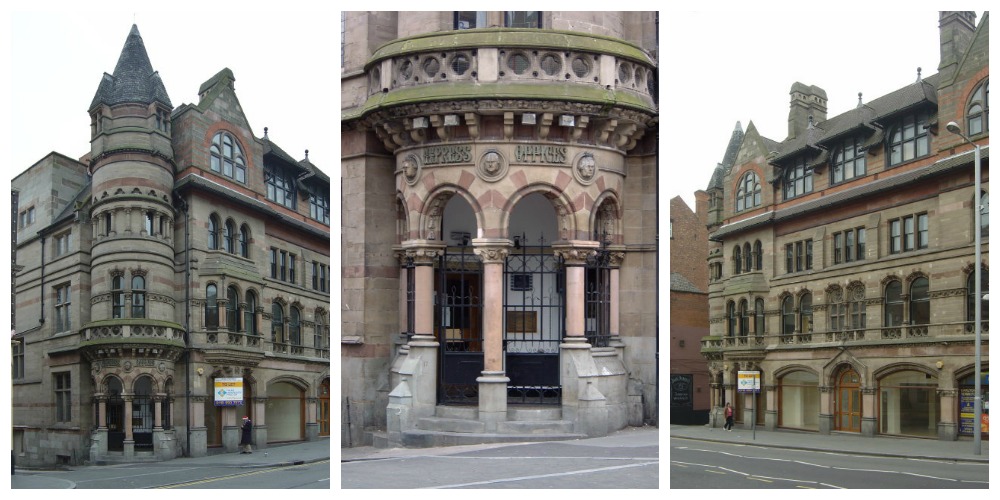
His office on George Street, built as a “shop window” for his work after he was forced to move from Clinton Street by the arrival of the railway, is one of the hidden gems of Nottingham. I only found it recently while exploring the “Creative Quarter”, it was recently up for sale and there was talk that it was bought by some Fothergill enthusiasts with a view to renovating it as a museum.

The exterior is a homage to his mentors with busts of the architects Augustus Pugin, George Street, George Gilbert Scott , William Burges and Richard Norman Shaw honoured in stone. There are terracotta panels depicting architecture through the ages and masons at work on a gothic cathedral. The individuality of the design makes this a distinctive building for the 1890s, full of idiosyncratic details. This office, like many of Fothergill’s buildings, shows the influence of his travels in Bavaria and Venice, with details from European Gothic given a particular Victorian twist.
Although Fothergill is no Gaudi or Mackintosh in terms of the scale or fame of his buildings, his distinctive style has left its mark on Nottingham. Some of his buildings did not survive the drive for modernism that swept through the city centre in the 1960s and 1970s. Notable losses include the Black Boy Hotel, which by the time of its demolition had become “notorious” (according to my mum at least…). It was pulled down in 1970 and a large branch of Primark now occupies in the spot on Long Row where once it stood.
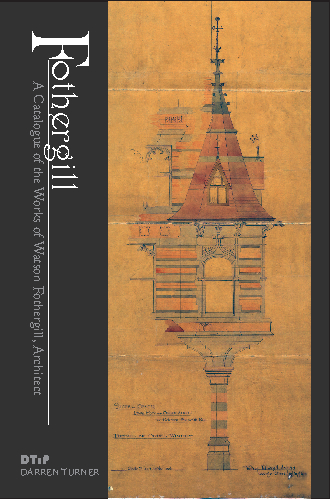
Darren Turner’s book goes a long way to establishing a full list of extant buildings as well as clarifying the provenance of some which have been mis-identified in the past and I look forward to discovering more of them on my walks through the city.
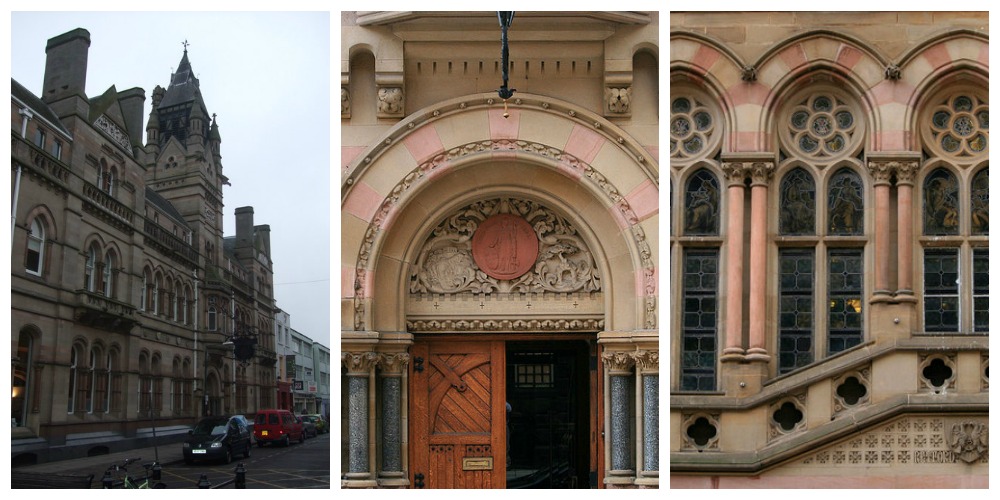
I’ve been “Tied up in Nottz” for the past few months… here’s a postcard from “Nottingum”
Rough Trade have just opened the doors of their new record shop/ café bar on Broad Street at the heart of Hockley, and Nottingham gains another hip hang out to add to the Broadway Cinema, Lee Rosy’s Tea Shop, established record shop The Music Exchange and an ever growing selection of cafés and independent shops.
With industrial chic inside and free air for your fixie outside, Rough Trade arrives just in time for vinyl junkies and lovers of cult fiction to fill up their Christmas stockings.

Down the road, more music emanates from a street piano. A chap known as ‘Dave Keys’ knocks out some tunes under the ‘Nottingham Legends’ mural where local luminaries such as Jake Bugg and Samantha Morton are immortalised alongside literary creation Byron Clough and the legendary Su Pollard.

The Hockley area along with the Lace Market and the redeveloped Sneinton Market is being marketed as Nottingham’s Creative Quarter – “Nottingham’s flagship project for economic growth, enterprise and entrepreneurial spirit.”
It will also soon be home to the National Videogame Arcade (opening next March) with five floors of games themed archives, exhibitions and activities to compliment the annual Game City Festival.
Meanwhile check out the array of vintage clothes shops including old favourite Wild Clothing, White Rose and Oxfam in the original Boots the Chemist building on Goose Gate and the massive Sue Ryder charity shop a couple of doors down.